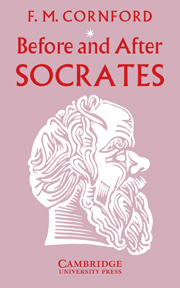I - IONIAN SCIENCE BEFORE SOCRATES
Published online by Cambridge University Press: 05 August 2014
Summary
In this course of lectures it falls to me to speak of the whole creative period of Greek philosophy—of the Ionian science of Nature before Socrates, of Socrates himself, and of his chief followers, Plato and his pupil Aristotle. I cannot attempt even a bare outline of the history of thought in a period covering nearly three centuries, the sixth, fifth, and fourth, before our era. I shall only try to explain why the life and work of Socrates stand out as marking the central crisis or turning-point in that history. We speak of the pre-Socratics, then of Socrates, and finally of the Socratic philosophy elaborated by Plato and Aristotle. Why should the name of Socrates be used to describe the philosophy that came before him as well as the philosophy that came after?
Plato in one of his dialogues has made Socrates himself describe the revolution of thought he effected—how he turned philosophy from the study of external Nature to the study of man and of the purposes of human action in society. In the Phaedo, the conversation between Socrates and his friends on the day of his death reaches the question whether the soul is a thing of the sort that can begin and cease to exist. This question calls for a review of the explanations that had been given of the becoming and perishing of transitory things. Let me recall the substance of that famous passage.
- Type
- Chapter
- Information
- Before and after Socrates , pp. 1 - 28Publisher: Cambridge University PressPrint publication year: 1932

